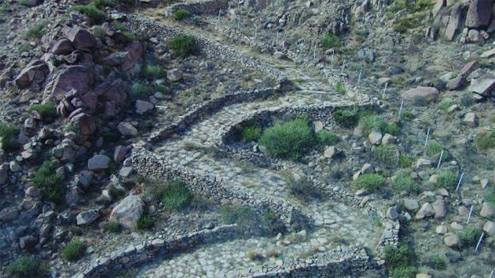 ISLAMABAD (September 02 2010): The Cabinet has been informed that GDP will decline to 2.5 percent, from projected 4.5 percent, for the current fiscal year (2010-11) as a result of damage to various sectors of the economy by floods. The Minister for Information, Qamar Zaman Kaira, told media here on Wednesday at a news conference after the Cabinet meeting that budget deficit might touch 6 to 7 percent of GDP for the ongoing fiscal year and inflation 15 to 20 percent.
ISLAMABAD (September 02 2010): The Cabinet has been informed that GDP will decline to 2.5 percent, from projected 4.5 percent, for the current fiscal year (2010-11) as a result of damage to various sectors of the economy by floods. The Minister for Information, Qamar Zaman Kaira, told media here on Wednesday at a news conference after the Cabinet meeting that budget deficit might touch 6 to 7 percent of GDP for the ongoing fiscal year and inflation 15 to 20 percent.
He said that the scale of devastation by floods had disturbed all macroeconomic indicators of the country and would be revisited after damage need assessment. He said that a significant increase in inflation is expected in the short run ie, 1-3 months in the face of short supply due to crop destruction. However, the government would make every possible effort to control it.
The Cabinet meeting, he said, was informed that prices of daily use items such as vegetables, spices, lentils, fruits, meat, and milk products will go up considerably. The meeting was also told that medium-term inflation for 4 to 8 months would increase due to spike in prices of wheat, rice and sugar until the next harvest.
The Minister said there is a possibility that the government might get relief in debt servicing but how much and for how long can not be predicted at this point in time. He said that reservations of provinces with respect to their share from the foreign assistance would be discussed in the forthcoming meeting of the Council of Common Interests (CCI).
He said that the Prime Minister informed the Cabinet that to finalise a national strategy on the rehabilitation of the flood affected people, the Council of Common Interests (CCI) meeting has been convened on Friday for approval of the strategy that was finalised in consultation with the provinces. He said that the economic loss by floods would translate into massive job losses and incomes of thousands of families along with serious social repercussions. The overall performance of agriculture would be affected for the current as well as for the next fiscal year.
Kaira said that the meeting was told that this loss would have a snowball effect on manufacturing, services and export sectors and consequently most of the families would be facing real risk of income and employment. He said that the devastation is likely to affect revenue collection and increase expenditures, which will widen the budget deficit. The flood damage would also adversely affect textile and sugar sector and ultimately the balance of payment and external resource stability.
The Cabinet meeting was told that manufacturing may also considerably decline below the target of 5.6 percent. He said that services sector (including wholesale and retail trade) constituting more than 50 percent of GDP, dependent on agriculture, manufacturing, imports, exports would also be affected.
Additionally, he said, shortages and increased demand of construction materials, fertilisers and pesticides would contribute to hike in non-food inflation. The Minister said that government priorities would have to be re-determined in the wake of the floods. He said that expenditures would have to be cut down, funds have to be diverted and belts have to be tightened to meet the needs of reconstruction and rehabilitation of the flood affectees.
The government would also mobilise external and internal resources to meet expenditure on re-construction at least for the next 3 years, he added. The Cabinet was told that based upon the Damage Need Assessment (DNA), the Economic Affairs Division (EAD) would organise an international donors’ conference in late October/November to muster financial support of the international community for the reconstruction.
The government is also planning to build medium and small dams on priority basis to harness the excesses of water. Some of the planned mega dams like Diamir-Bhasha will also be prioritised for construction. The Cabinet reviewed the status of implementation of Cabinet decisions pertaining to Sports and States & Frontier Regions.
The Cabinet also reviewed the decisions taken by Economic Co-ordination Committee (ECC) of the Cabinet in its meetings held on July 20 and 29, 2010. The Cabinet decided to renegotiate the Pakistan-Australia Agreement on Promotion and Protection of Investments. It also reviewed the signing of Grant Agreement with the Government of Japan for the Project “Extension of Water Supply System in Faisalabad”.
The Cabinet approved, in principle, to start negotiations on MoU for grant of $1.4 million from government of Brunei Darussalam for earthquake affected areas. The Cabinet also approved the signing of agreement on Economic, Scientific and Technical Co-operation with Romania.
The Cabinet also approved the ratification of Saarc Convention on Co-operation on Environment. The Cabinet reviewed the agreement between Ministry of Agriculture, Government of Tajikistan and Ministry of Food and Agriculture, Government of Pakistan about co-operation in the field of Agriculture. The Cabinet reviewed the MoU between Government of Tunisia and the Government of Pakistan on Agriculture Sector and ratified approved Additional Protocol to the Agreement Concerning the Organisation of Pakistani Manpower Employment in the State of Qatar.
The Cabinet also ratified the MoU signed during the visit of Chinese Vice Premier, Zhang Dejiang, as well as Convention between Government of Pakistan and the Government of Serbia for the avoidance of double taxation with respect to taxes on income. The Cabinet approved a Bill to provide for establishment of Shifa Tameer-e-Millat University at Islamabad, replacement of bank notes of Rs 5 denomination with Rs 5 coin and demonetisation of Rs 500 old design of banknote – Brecorder











